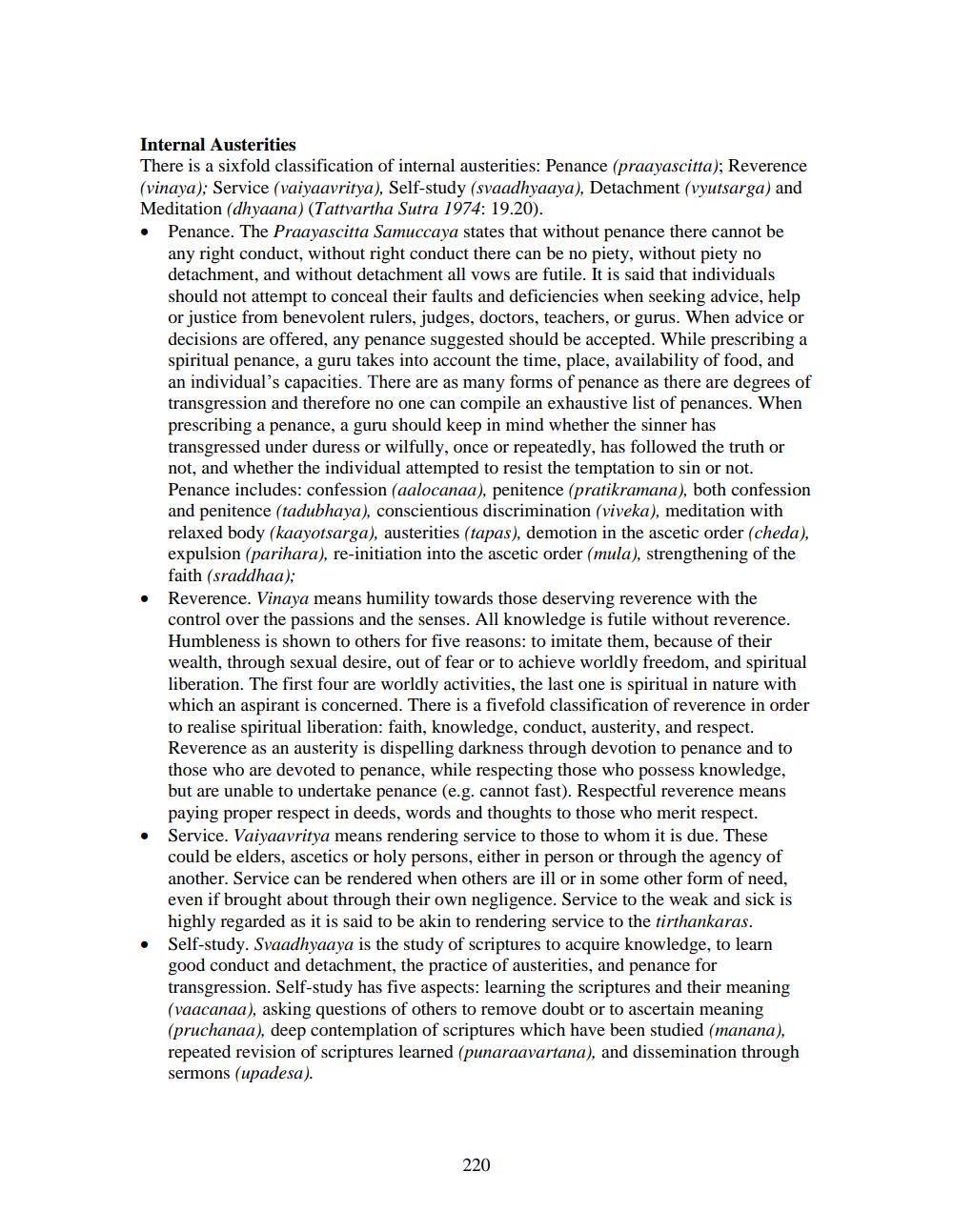________________
Internal Austerities There is a sixfold classification of internal austerities: Penance (praayascitta); Reverence (vinaya); Service (vaiyaavritya), Self-study (svaadhyaaya), Detachment (vyutsarga) and Meditation (dhyaana) (Tattvartha Sutra 1974: 19.20).
Penance. The Praayascitta Samuccaya states that without penance there cannot be any right conduct, without right conduct there can be no piety, without piety no detachment, and without detachment all vows are futile. It is said that individuals should not attempt to conceal their faults and deficiencies when seeking advice, help or justice from benevolent rulers, judges, doctors, teachers, or gurus. When advice or decisions are offered, any penance suggested should be accepted. While prescribing a spiritual penance, a guru takes into account the time, place, availability of food, and an individual's capacities. There are as many forms of penance as there are degrees of transgression and therefore no one can compile an exhaustive list of penances. When prescribing a penance, a guru should keep in mind whether the sinner has transgressed under duress or wilfully, once or repeatedly, has followed the truth or not, and whether the individual attempted to resist the temptation to sin or not. Penance includes: confession (aalocanaa), penitence (pratikramana), both confession and penitence (tadubhaya), conscientious discrimination (viveka), meditation with relaxed body (kaayotsarga), austerities (tapas), demotion in the ascetic order (cheda), expulsion (parihara), re-initiation into the ascetic order (mula), strengthening of the faith (sraddhaa); Reverence. Vinaya means humility towards those deserving reverence with the control over the passions and the senses. All knowledge is futile without reverence. Humbleness is shown to others for five reasons: to imitate them, because of their wealth, through sexual desire, out of fear or to achieve worldly freedom, and spiritual liberation. The first four are worldly activities, the last one is spiritual in nature with which an aspirant is concerned. There is a fivefold classification of reverence in order to realise spiritual liberation: faith, knowledge, conduct, austerity, and respect. Reverence as an austerity is dispelling darkness through devotion to penance and to those who are devoted to penance, while respecting those who possess knowledge, but are unable to undertake penance (e.g. cannot fast). Respectful reverence means paying proper respect in deeds, words and thoughts to those who merit respect. Service. Vaiyaavritya means rendering service to those to whom it is due. These could be elders, ascetics or holy persons, either in person or through the agency of another. Service can be rendered when others are ill or in some other form of need, even if brought about through their own negligence. Service to the weak and sick is highly regarded as it is said to be akin to rendering service to the tirthankaras. Self-study. Svaadhyaaya is the study of scriptures to acquire knowledge, to learn good conduct and detachment, the practice of austerities, and penance for transgression. Self-study has five aspects: learning the scriptures and their meaning (vaacanaa), asking questions of others to remove doubt or to ascertain meaning (pruchanaa), deep contemplation of scriptures which have been studied (manana), repeated revision of scriptures learned (punaraavartana), and dissemination through sermons (upadesa).
220




